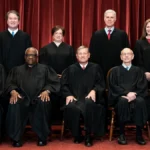The judicial branch
As the Supreme Court of the United States (SCOTUS) wrapped up its 2022 session, autocracy and government overreach have been dealt a significant blow. At least six of the nine justices understood their role as the final arbiter on constitutional matters, while three of them opted for a more biased approach to their sworn duties.
Sadly, many continue to deride the Supreme Court’s decisions, simply because they do not understand the judiciary branch’s role. This courts obligation and mandate under the constitution is to interpret cases based on our founding documents language. For example, “a citizen’s right to keep or bear arms shall not be infringed.” This is the basis they must use to evaluate second amendment cases, much like the one from New York that was recently overturned.
Same goes for the Roe v Wade case recently decided in favor of state’s rights.
While many may not agree with the court’s decisions, they were undoubtably the correct ones. Despite picketers and parades outside their homes, followed by armed hitmen, they carried out their constitutional duties. The majority of the Supreme Court reminded us that their role is not to pick sides, but rule on matters of law that require constitutional interpretation. There should be no deviation from this mandate.
The framers and ratifier’s understood that a fair and impartial judiciary, one that followed the law, and was unbiased, non-partisan or refused to be intimidated was central to a people’s republic form of government. Without judicial independence, the ability to be fair and impartial would be non-existent.
Over the past several decades, many of our fellow citizens have adopted a limited understanding of the Supreme Courts role and its limitations. They believe that SCOTUS has a role in the law-making process, when it clearly does not; and a degree of supremacy over the other two branches. Neither of these views could be further from the truth.
Although the courts hold a key place in our constitutional republic, the far-left has adopted a lofty conception of their authority. Its origin can be traced to the influence of modern-day liberalism. The progressive liberals believe the court and the constitution are evolutionary instruments of social and political change. This attitude is dangerous and certainly detrimental to our constitutional republic. Their efforts to pack or expand the Supreme Court, eliminate the senate filibuster, or adding new states to the union (Puerto Rico and D.C.) are simply the latest attempts to usurp the court and America’s constitution.
With that understanding, the left’s view of the court, and its utilization to create change from within, is counterintuitive to our founding documents and to a constitutional people’s republic. SCOTUS is one of three equal branches, with no more power or authority than the other gives it. It is co-ordinate and co-equal with the others, “and that each therefore has an equal power to interpret the Constitution authoritatively in the execution of its own powers.”
America’s founding documents are suffused with definitive explanations that affirm the courts roles within the branches of government. As stated in the Federalist Papers, Alexander Hamilton goes to great lengths to spell out the judiciary role and its limitations. “There is no position which depends on clearer principles, than that every act of a delegated authority, contrary to the tenor of the commission under which it is exercised, is void. No legislative act, therefore, contrary to the Constitution, can be valid.”
Contrary to common belief, the court is not there to provide oversight on the branches of government. As stated in Article III, the role of the court is to assist the other branches in legally carrying out the authoritative acts of the government; and providing the legal and factual foundations if necessary.
As of the beginning of October 2022, the Supreme Court has begun its next term. Important cases on the docket include, affirmative action, voting rights, free speech and religious liberty. I’m quite confident these heroic judicial appointees will conduct themselves in a matter befitting of America’s glory.
Thank you and God bless America
Vincent Cavaleri
Silent Majority Foundation


Terrific summary of the original intention of the separation of power. Lets get a “masterclass” featuring the SMF tribe to help daylight these truths!
Thank you for the idea of a “master class”! Our hope is that as litigation slows down, we can do more with education.